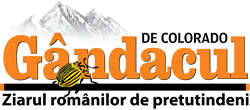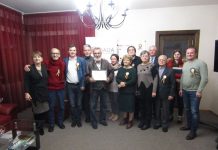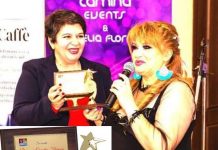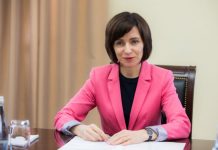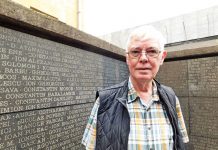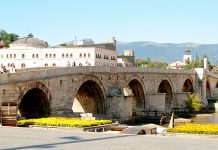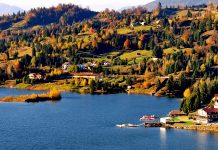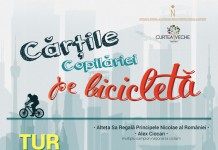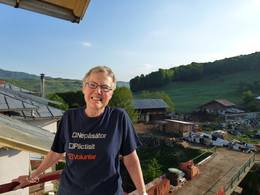 How do orphans, abused women, mentally and physically handicapped, and abandoned senior citizens form a community? Answers are not easy to come by after two weeks at Pro Vita, an orphanage located near Valea Screzii, a village so small it doesn’t appear on maps of the area. The orphanage is only approachable by a dirt and gravel roadabout a half hour from the town of Valenii De Munte.
How do orphans, abused women, mentally and physically handicapped, and abandoned senior citizens form a community? Answers are not easy to come by after two weeks at Pro Vita, an orphanage located near Valea Screzii, a village so small it doesn’t appear on maps of the area. The orphanage is only approachable by a dirt and gravel roadabout a half hour from the town of Valenii De Munte.
It was established in the 1990s by a Romanian Orthodox priest. Pro Vita is an independent organization committed to providing homes for abandoned children, women and families in difficulties, abused mothers, adults who grew up in state institutions, pregnant women who have nowhere else to go and abandoned seniors. Managing Pro Vita are Mihail (son of the founder) and Melanie (originally from the UK) Tanase. Melanie and Mihail have a policy of never refusing anyone who comes seeking assistance, which means there is always an extraordinary patch work of children and adults staying there. Nor is there any rule about departures. The inhabitants can stay as long as they need to.
Melanie and Mihail are very warm, caring people and the orphanage, made up of all sorts and conditions, does have the feel of an extended family. Into this community a group of 12 Americans including myself came tovolunteer for two weeks. Our first task was to begin to orient ourselves to the various homes and occupants who are usually housed by age and/or affliction. There are about 30 children under the age of 18 and the main challenge is the lack of care givers. Pro Vita has 10 “house mothers” working on a shift pattern with each working 12 hours per day, seven days a week. What these children lack most is the kind of adult contact that would be the expectation in normal family situations.
Adults with mental conditions or who have learning disabilities are largely the result of old-style communist institutions which left many permanently traumatized. There were nine women and one man at Pro Vita. At the age of 18 they left state run care. Many of these young adults have a mental age much less than their physical age. Women and children in difficulties are housed in nine safe houses. Some are escaping abusive husbands or families, but all are in need of refuge and some help to solve their problems are restart their lives. Pro Vita assists these families by providing accommodation, food, electricity, firewood, furniture, clothes and legal assistance.
Some of the needs of the orphanage are readily apparent and almost overwhelming. A group of volunteers twice our size who stayed for a month would scarcely make a dint in it. The majority of our group spent the two weeks painting rooms in the house where the women with mental conditions were housed. The transparent joy and gratitude of the inhabitants was overwhelming and made working in the heat (in the upper 80’s most days) all worthwhile. The toddler’s playground was cleared of rocks and glass shards and the equipment repaired and repainted. And, at the request of some of the children, a fine rabbit hutch was constructed out of materials found scattered around the premises.
I took on a variety of tasks in the morning: sweeping and damp mopping the floors of our guest house and cleaning the kitchen and dining room. Because of the gravel road dirt and dust are ever present. Sorting donated clothing that arrived in big boxes from all over Europe and delivering the clothes to the appropriate houses; how does it feel to never have anything new of your own? Sorting and cataloguing donated books and CDs and marveling at how big a presence Readers’ Digest is in Romania. And doing all the ironing for one of the houses. The steam iron was wonderful, but there was no ironing board so we covered their dining table with blankets and sheets to make a work space.
After a couple of hours we moved the ironing operation to just half of the table so a qualifed woman from the village could come in and work with a severely handicapped 10 month old, the child of two handicapped parents. A beautiful child with blond curly locks, but obviously not well. The woman moved her arms and legs and massaged her back and neck, what is called “patterning” in America, so the baby wouldn’t lose the possibility of potential movement even though her future prognosis is not good.
Afternoons I soon found my niche in a house with two house mothers and about nine children, boys and girls, around the age of 8. The two women both spoke a bit of English, one about at my level of Romanian and the other much better. I worked with them on their English and in turn picked up a bit of Romanian including the invaluable phrase, “Fii cuminte!” When they had gotten up from their naps. The children are picked up early in the morning by the Copii Transporte and taken into the schools in town. They return around 2 and have naps after which I was able to help them with their home work. As a reward they enjoyed the pages copied from the Estes Park Coloring Book which I explained was where I lived. I’d also taken plenty of picture postcards to leave with them. I am eternally grateful to Lucian Oprea for helping me to learn enough Romanian to work with these children. I am a long way from being fluent, but I did know enough to spot spelling mistakes and pronunciation errors. And I loved working with these children and, by extension, providing some relief for the house moms.
Audena, one of the house mothers whose English was about the same as my Romanian said to me one day, “You are happy? You have a good life?” You are free? My answer to each question was, “Yes”. She then responded, “I’m not free?” It broke my heart because, of course, she’s not. A beautiful woman and abused wife whose son lives with her in the house. How could she ever be free in the sense that I am. There was a similar conversation with the kitchen helper in the guest house. Varica was a pretty woman, very petite, who always had a big smile first thing in the morning, but who had been badly abused. Thank goodness for Italians with “Dentists without Borders” who spent a week there doing dental work for the community including restoring some of her teeth.
My room was on the third floor of the guest house overlooking the farm buildings and a little river. Even to call it a river is a huge overstatement. It was so polluted that I’m sure if you stuck your toe in it, it would fall off. When the stalls were mucked out all the animal waste was dumped into the river. The animals included cattle, sheep, goats, pigs, horses, a donkey, chickens (including roosters who crowed at all hours of the day and night), cats and 40 – 50 dogs who run wild during the day and bark/howl all night…when they aren’t contributing to the uncontrolled spread of puppies in evidence everywhere. When the wind was “right” the stench was almost unbearable.
And there was the rubbish piled in every open space, mountains of it. Remains of dental equipment, skeletons of cars, broken furniture, metal frames, wrecked trucks, washing machines, and bed frames, the list goes on and on. Romania is such a beautiful country and it was difficult to see this sort of blight on an otherwise wonderful site. Imagine Estes Park obliterated by stacks of rubbish. Apparently they can’t afford to have the junk hauled away. Such conditions, rarely seen even in extreme poverty here, made me aware of how sanitized life is in America. This, of course, could also be the result of not having any relationship with the government in Romania.
Other bits and pieces. We were taken into Valleni De Munte one day just to wander around and those of us trying to make purchases soon discovered that we had to have exactly the right amount to make a purchase One of the group couldn’t even get change at the bank. We learned that change is a problem because there isn’t enough money in circulation. Also while there I visited the home and memorial of Nicolae Iorga, a famous Romanian scholar and learned a bit about his life.
We visited with the local Orthodox priest one evening and on another occasion he planned a special prayer service for us. I was the only one in the group who’d ever been to an Orthodox service and I think most of the volunteers enjoyed the chanting and incense, but at only 45 minutes I’m not sure it qualified as the real thing which usually lasts closer to two hours!
Most of the adults and children were there and participated in the chanting and responses and the children clearly adored the priest. We usually had breakfast at nine, lunch at one and dinner at seven. Everyone pitched in to set the table and carry food in from the kitchen. 90% of the food at Pro Vita is either produced on site or donated and all of it is prepared in huge kettles over open fires and delivered to the house.
Bread was available at every meal and was wonderful. Breakfast was usually cereal, yogurt, cold cuts, cheese (I never met a Romanian cheese I didn’t love!), tomatoes and cucumbers. Lunch consisted of soup; rice, potatoes, pasta or polenta; and dinner was soup again, salad and on occasion, a piece of chicken. Fresh fruit was always available and it didn’t take us long to discover the stash of ice cream bars in the freezer. They were so good: vanilla ice cream covered with chocolate and nuts and with a soft caramel center! At the end of two weeks, I confess I was ready to return home and escape the dust, dirt, smells and barking dogs for awhile, but I will undoubtedly want to return to Pro Vita. After my stay, the answer to the question, “How do orphans, abused women, mentally and physically handicapped and abandoned senior citizens form a community? is obvious. Because under Mehail’s and Melanie’s leadership they work at it. I am humbled and gratified to have been a part of that work for even a short time.
